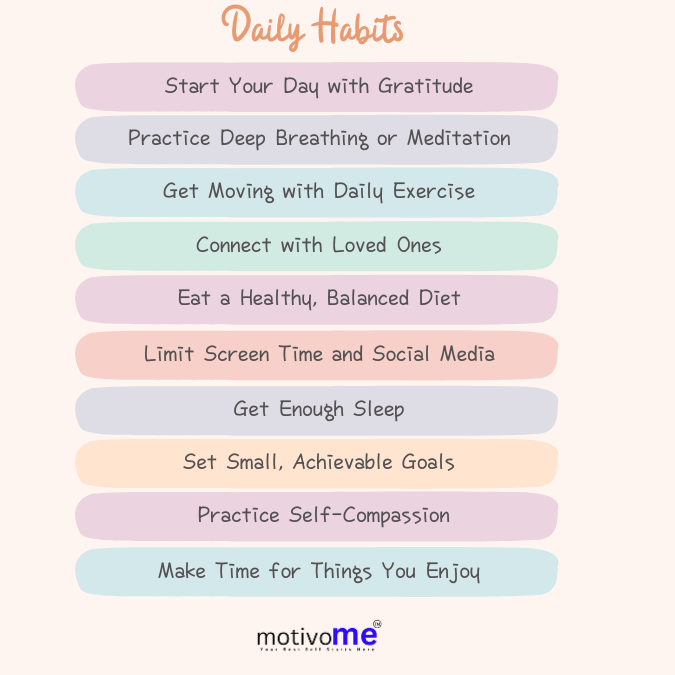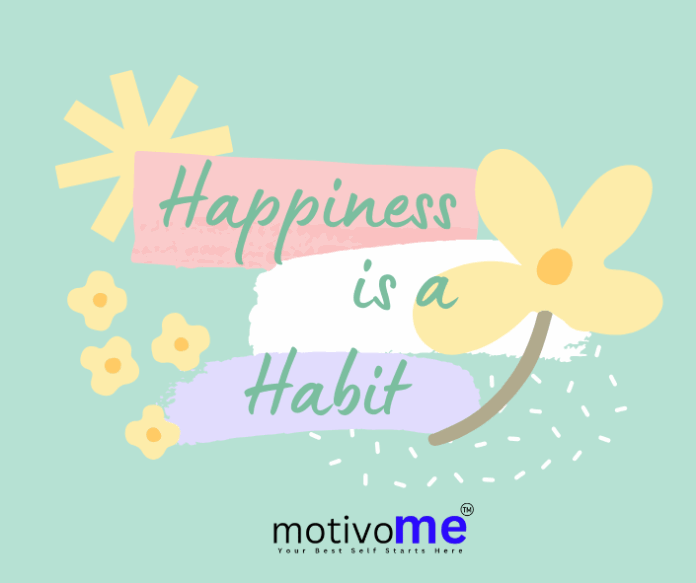Similar to maintaining your physical well-being, it is equally important to take good care of your mental health. A healthy mind begets a happy life, and the good news is that improving mental health does not need to be complex. Adding small, simple habits to your daily routine can make a big difference in how you feel.
In this article, we are going to look at ten easy habits that can help anyone in improving his or her mental health every day. These tips are simple to understand and apply; thus, they become quite easily achievable by every person who desires to live in better and more balanced ways.
- Start Your Day with Gratitude
Gratitude is a simple, effective, inexpensive avenue towards better mental health. Focusing on what you’re grateful for first thing in the morning flips your mind toward positives and away from negativities. This little practice makes one grateful for the good things in life-even the minute details.
How it’s done: First thing upon awakening, think of three things you are grateful for. Those can be as simple as sunshine, good sleep, or a tasty breakfast. Putting these things into a journal may make this habit even more effective.
- Engage in Deep Breathing or Meditation
While stress is a normal part of life, you can learn to manage your stress by becoming more mindful of your breath or meditating. This will clear your mind and help reduce anxiety, which also can help with better focus.
How: Set aside five to ten minutes each morning to breathe or meditate. Take guided app meditations, like Headspace or Calm, or find a quiet seat and close your eyes and focus on your breath.
- Daily Exercise: Get Moving
One of the best things about exercise, in addition to its benefits for the body, is that it’s equally great for the mind. The endorphins released through physical activity are often referred to as the “feel-good” hormones because they improve your mood and reduce stress.
How to do it: You do not necessarily need to invest hours in the gym. Even a 20-minute walk, yoga session, or light stretching will help. Find something you like, then make it part of your day.
- Connect with Loved Ones
Good social networks are conducive to good mental health. Spending time with family and friends will help anyone feel valued and supported while this might provide an avenue for releasing thoughts and feelings as a vent for stress.
How to do it: Devote a few minutes every day to talking with a loved one. It can be over the phone, a text message, or talking in person. Just a few minutes could lift your mood.
- Eat a Healthy, Balanced Diet
What you eat has a direct impact on your mental health. A diet balanced with fruits, vegetables, lean proteins, and whole grains works to keep your brain fueled and your mood stable. These foods, such as fish, nuts, and seeds, contain omega-3 fatty acids, which are known to support brain health.
How to do it: Stress variety in nutrient-dense foods throughout the day. Sugar, caffeine, and processed foods feed mood swings and fatigue. The consumption of ample water will go a long way toward keeping you hydrated, as it can also have an effect on your mental clarity.

- Reduce Screen Time and Social Media
Although technology and social media can keep you connected, too much screen time has negative effects on a person’s mind. For every minute spent on social media, constant exposure to it makes one anxious, comparative, and at times lonely.
How to do it: Set a boundary around the time spent on your phone, computer, and watching TV. Try having blocks of time during each day that you consider yourself “screen-free,” like the hour right when you get up in the morning or the last hour before bed. Focus more on real-life interactions and activities that make you feel more down-to-earth.
- Sleep Enough
Sleep indeed plays a huge role in your mental health. When you don’t get enough rest, you can very well have a tendency to feel irritable, stressed, and unfocused. Good sleep gives your brain a chance to recharge, thus raising the mood and overall well-being.
How to do it: Get 7-9 hours of sleep each night. Create a sleep ritual, a bedtime routine including things that are relaxing, such as reading a book, taking a warm bath, or doing relaxation exercises before retiring to bed. Steer clear of caffeine and evening screens in order to let your body wind down.
- Set Small, Achievable Goals
Setting small, achievable goals for each day gives one some sort of purposeful work to feel accomplished about. These, although trifles, boost one’s ego and act as motivators to get going.
How to practice it: Every morning, write down one or two easy goals you want to achieve that day. These may be work-related tasks, personal projects, or anything as trivial as cleaning your room. Cross off the goals you accomplish because that gives you a feeling of moving forward and control over the day.
- Practice Self-Compassion
Probably the most significant of all is being kind to oneself, for mental health. Everyone makes mistakes or has bad days; however, it is essential not to be too self-criticism and negative self-talk. Working self-compassion means being as kind to yourself as you would be to any other friend.
How to put this into practice: Every time you notice that you are being mean to your self, stop yourself, take a deep breath, and reword those thoughts into a positive or neutral light. Instead of “I failed,” say, “I learned something important.” Remind yourself that mistakes are just part of the learning process, and every new day gives you a chance for a fresh start.
- Give It Time to Enjoy
Doing things liked can help an individual relax and lighten up, making life more fun. This could be in a hobby a person enjoys, in nature, or just reading a book. The things enjoyed can highly benefit mental health.
How to do it: Devote some time each day to do what makes you happy. It may be something minute, only 15 minutes of your hobby or just a casual short walk, but your happiness will reach another dimension. Give more importance to your happiness and build time around your fun activities.




